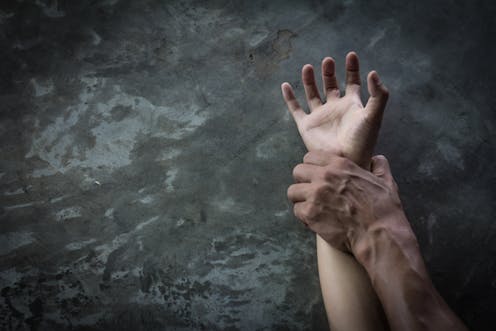'Cultural misogyny' and why men's aggression to women is so often expressed through sex
- Written by Xanthe Mallett, Forensic Criminologist, University of Newcastle

As the country watches Scott Morrison grapple with the sex scandals rocking our federal parliament, it is worth wondering what has really changed since former Prime Minister Julia Gillard’s now-famous 2012 “misogyny” speech[1].
The power of that speech is undeniable, and it resonates loudly today.
Gillard spoke to the imbalance of power between men and women and the under-representation of women in positions of authority. Her speech raised serious concerns about how some politicians saw women’s roles in contemporary Australia.
Fast forward to yesterday, and Scott Morrison attempted to address the most recent shocking allegations of lewd behaviour by some coalition staff – the allegation being a group of government staffers had shared images and videos of themselves undertaking lewd acts in Parliament House, including in the office of a female federal MP.
These stories raise the question as to why some men participate in sexually denigrating women – both those in authority as well as those in positions of submission in hierarchical organisations. And why is male aggression towards women so often expressed through sex rather than through other means?
As a criminologist, I interpret men’s sexually aggressive behaviour – whether it is desecrating a women’s desk by videoing himself masturbating on it, or a sexual assault – as an activity born of a need for power and control.
When some men feel challenged, or want to dominate someone to fulfil an innate internal inadequacy, they can feel the need to do so sexually. Often, the subjects of their rage about feelings of inadequacy are women.
From lewd comments, to being groped, through to sexual assault, the attacks on women in the workplace continue.
Research suggests[2] heterosexual men who are more socially dominant are also more likely to sexually objectify women. When these men are placed in positions of submission to women at work and their dominance is challenged, the levels of sexual objectification of women go up. This supports the assertion that some men increase their dominance by sexually objectifying women, and this objectification can become physical.
This conversation around how we address this has been building for some time.
Read more: Sexism, harassment, bullying: just like federal MPs, women standing for local government cop it all[3]
In 2017, the #MeToo movement[4] went viral, as women started to share their negative sexual experiences via social media. The discussion initially focused on women being sexually harassed by their bosses in the media and entertainment industry, but it soon became obvious the problem was much wider than that. It permeates every industry in every country.
Sexual harassment and assault are more common than many people might believe, or want to believe. A 2018 study[5] surveyed 2,000 people in the US. It found 81% of women and 43% of men had suffered some form of sexual harassment or assault. Further, 38% of the women surveyed said they have suffered from sexual harassment in the workplace.
The picture is mirrored in Australia. A 2018 Australian Human Rights Commission report[6] found 23% of women said they had been sexually harassed at work in the previous 12 months.
In 2021, we are still having the same debate.
One big question is where these bad male behaviours originate from?
Social Learning Theory[7] might help us to understand what is going on in relation to some men’s need for sexual domination of women. It is based in the premise that individuals develop notions of gender and the associated behaviours by watching others and mimicking them. This learning is then reinforced vicariously through the experiences of others.
Combine this learnt behaviour with cognitive development theory[8], which suggests gender-related behaviour is an adoption of a gender identity through an intellectual process, and we can see how misogynistic behaviours can be identified, remembered, and mimicked by subsequent generations of males.
This could be termed “cultural misogyny”.
How do we change the dynamic?
The only way to shift the framing around appropriate behaviour in the workplace, and society more generally, is to continue to break down gender stereotypes. Women need to be elevated to positions of power to reduce male domination in all aspects of life. We must challenge the undermining of women’s and girl’s autonomy and value when boys exhibit it, to break the chain of passing on these negative attitudes.
Read more: #MeToo has changed the media landscape, but in Australia there is still much to be done[9]
We are only now beginning the hear the breadth of stories from women speaking out about their own negative experiences.
As a woman in academia – a very hierarchical structure – I have been sexually harassed, and I just accepted it as part of my working world. My experience was with a very senior member of a previous university, and I would never have considered challenging him or reporting it, as I was very well aware of the power he had over me and my career. I even considered changing organisations to avoid the unwanted behaviours.
The brave women who are now speaking up have changed the way I view my own experience. The more we raise our voices, support each other and encourage change in the attitudes around us, the more we will all benefit.
References
- ^ 2012 “misogyny” speech (www.youtube.com)
- ^ Research suggests (journals.sagepub.com)
- ^ Sexism, harassment, bullying: just like federal MPs, women standing for local government cop it all (theconversation.com)
- ^ #MeToo movement (www.abc.net.au)
- ^ A 2018 study (stopstreetharassment.org)
- ^ report (humanrights.gov.au)
- ^ Social Learning Theory (www.simplypsychology.org)
- ^ cognitive development theory (www.simplypsychology.org)
- ^ #MeToo has changed the media landscape, but in Australia there is still much to be done (theconversation.com)

















